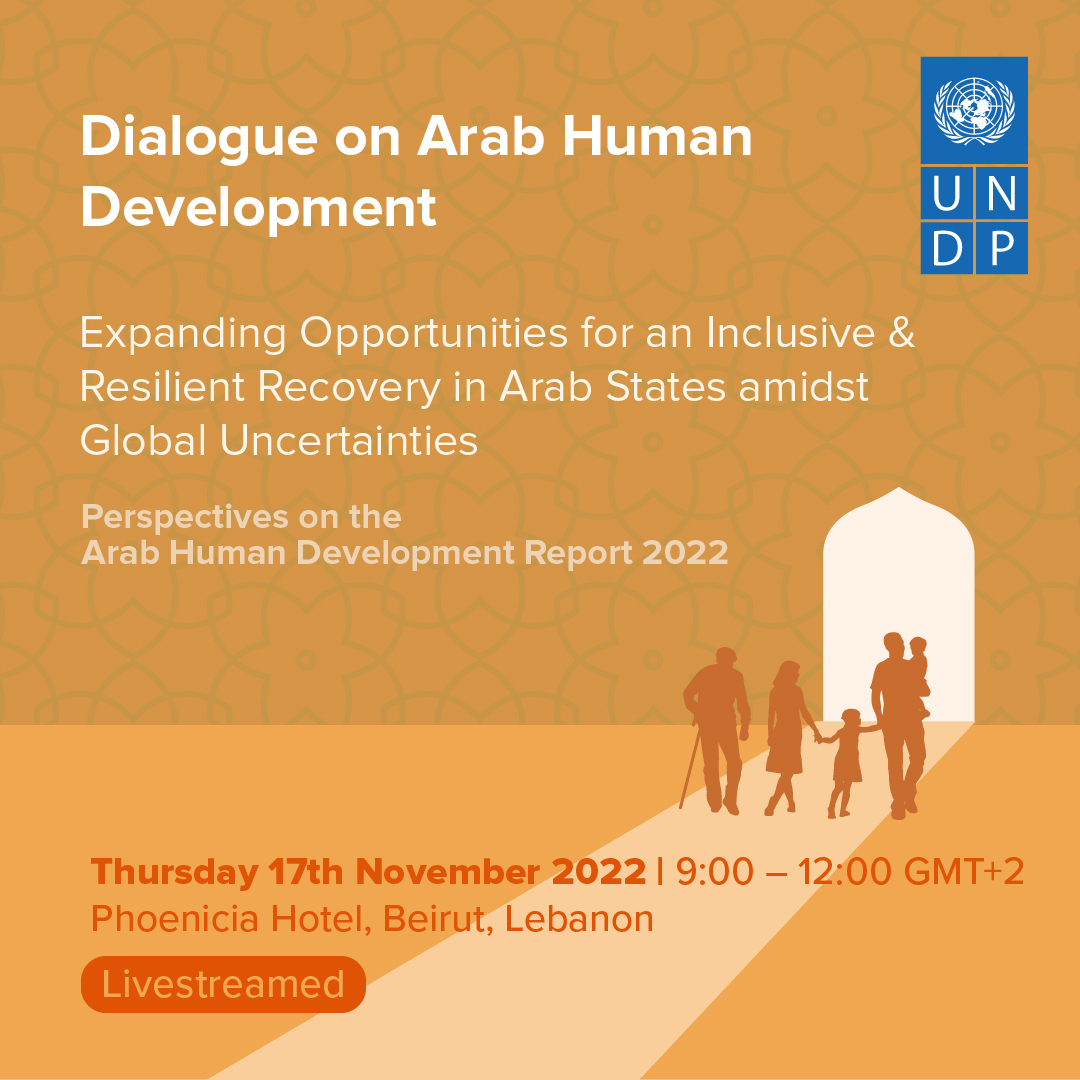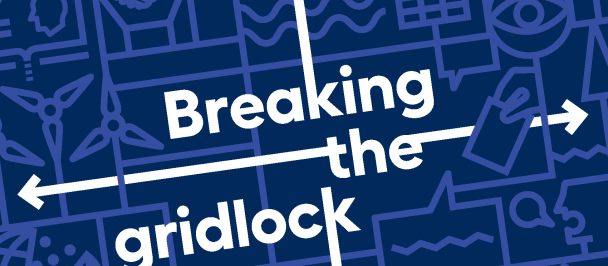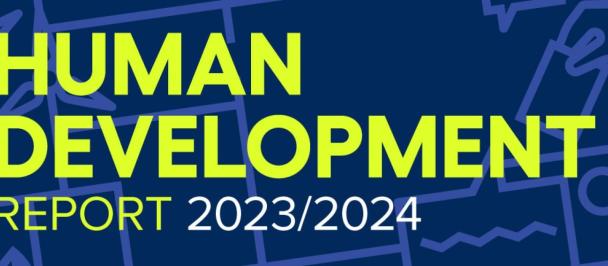Experts in Arab Human Development Dialogue: Building resilience to future shocks key to putting development on a forward track towards the SDGs in the Arab States region
November 17, 2022

Beirut – Eminent experts from the Arab States region who convened for the Arab Human Development Dialogue that was hosted by the United Nations Development Programme (UNDP) here today agreed that resilience-proofing the future is critical for the region’s recovery after the Covid-19 pandemic.
Strengthening institutions, governance and economic systems, and service delivery infrastructures to anticipate, cope with, manage and prevent crises is necessary for countries of the region to be able to navigate intersecting multi-faceted global and regional uncertainties and crises that are shaping our world today and into the future. The dialogue was based upon the analyses, findings and recommendations of the Arab Human Development Report 2022: Expanding Opportunities for an Inclusive and Resilient Recovery in the Post-Covid Era, published in June 2022 as the seventh in the series of Arab Human Development Reports (AHDR). UNDP has commissioned these reports since 2002 to examine opportunities and challenges of human development in the Arab States region. Debates were also informed by the complementary conclusions and recommendations of UNDP’s global Human Development Report 2021-2022: Uncertain Times, Unsettled Lives: Shaping our Future in a World in Transformation, which was launched in September 2022.
“We must double down on a people-centred human development as a key instrument in our recovery toolbox, as we strive to build forward better after Covid-19,” asserted Khalida Bouzar, United Nations Assistant Secretary-General and UNDP’s Regional Director for Arab States. “We are clear on what it will take to get the region back on the track of sustainable development: tackling root causes of inequality and vulnerability; advancing towards more diversified and resilient economies; transforming the relationship between States and their citizens; and seizing the opportunity of recovery to reset our course towards sustainability.”
Bouzar spoke in the Opening Panel of the Dialogue, which set the stage for debates that followed. That panel also featured Imran Riza, United Nations Deputy Special Coordinator (UNSCOL) and Resident and Humanitarian Coordinator for Lebanon, and Mounir Tabet, Deputy Executive Secretary, UN Economic and Social Commission for West Asia (ESCWA). Both emphasized the importance of preventive approaches to development, aiming at reducing risk and strengthening resilience, and employing the vision of the 2030 Agenda for Sustainable Development and its 17 Sustainable Development Goals as the guiding framework.
In his keynote address at the Dialogue, HE Deputy Prime Minister of Lebanon, Saade El Chami said: “Lebanon has barely retained its position within the ranks of the group of countries with high Human Development, having recorded a consistent decline in its human development index over the past decade—a decline that has accelerated in recent years.” He added: “But we are determined to continue working with all partners to reverse this trend and provide all Lebanese with alternatives to maintain hope in the future and thrive again.”
Deliberations in the ensuing Expert Panel proposed that crises and uncertainties may be a “new normal” that we must contend with, as they will continue to shape the future of this region and the world. The panel featured Inaya Ezzedine, Member of the Lebanese Parliament and former Minister of State for Administrative Reform in Lebanon; Khalil Shikaki, Professor of Political Science, Board Member of the Arab Barometer and Director of the Palestinian Center for Policy and Survey Research; Alia El-Mahdi, Professor of Economics and former Dean of the Faculty of Economics & Political Science in Cairo University, Egypt; and Nasser Saidi, Chairman of the MENA Clean Energy Business Council in UAE and former Minister of Economy and Trade in Lebanon.
Globally, the scale and implications of crises—including the climate emergency, the threat of more serious pandemics of zoonotic origins, significant losses in biodiversity, rising cost of living and a looming food insecurity and shortages in energy supplies precipitated by impacts of the war on Ukraine-will be likely to spare no one.
At the regional level, uncertainties are exacerbated by protracted conflicts undermining development and social cohesion alongside long-standing deficits in governance, economic systems, and environmental stewardship that the Arab States region has been grappling with for decades.
Panelists suggested that navigating the future requires shifts in development policy responses that embrace uncertainty and build resilience to future waves of shocks, crises, and uncertainties. Proposed specific suggestions included innovating instruments for financing green transition, and for anticipating and enabling countries to deal with future economic emergencies, in addition to measures to rebuild trust in institutions, including greater investments in more human-centered development policies and social solidarity schemes that insure the most vulnerable against shocks and generate opportunities for the future.
Selected attributable quotes from the Expert Panel:
“The new social contract that we need must be grounded in human rights and be committed to realizing human security for all – adopting economic policies that are inclusive and human-centered, going beyond measures of mere economic growth to focus on human development as the desired outcome. We also need legal reforms to lead the way to greater gender equality – but legislation can only be effective if coupled with supportive social and cultural change.”
Inaya Ezzedine, Member of the Lebanese Parliament, Former Minister of State for Administrative Reform in Lebanon
“When we analyze trends of successive waves of our Arab Barometer surveys, we see that they point to several windows of hope, including some improvement in levels of satisfaction with government performance, but only in countries with more stable and stronger institutions; a leveling in the desire among youth to immigrate outside of the region; and a persistence of belief in liberal values, including in the worth of democracy, as the basis of governance.”
Khalil Shikaki, Professor of Political Science and Board Member of the Arab Barometer, Director of the Palestinian Center for Policy and Survey Research
“Spiraling national debt to GDP ratios are limiting the fiscal space for spending on essential social services that safeguard human development. Debt reduction strategies must become preconditions for future lending from regional or global institutions. Enabling conditions and incentives must be put in place to encourage greater private sector investments in social infrastructures. We must also improve preparedness for financial crises, possibly through setting up a Regional Economic Emergency Fund that all Arab countries contribute to.”
Alia Al-Mahdi, Professor of Economics and former Dean, Faculty of Economics & Political Science in Cairo University, Egypt
“For the Arab region, climate risks pose an existential threat. These must be addressed at a regional level, not only by ramping up mitigation and adaptation efforts within comprehensive climate risk strategies, but also through increased financing. The environment and the climate must become integral parts of our Arab banking industry and financial markets. GCC countries have an important role to play there. They have access to finances and the required technologies to help lead an Arab green transition. They can set up an Arab Green Bank to support it.”
Nasser Saidi, Founder & Chairman Clean Energy Business Council - MENA in UAE, former Minister of Economy and Trade in Lebanon.
For more information and media inquiries, please contact:
Rana Moughabghab | Communication Team Leader | UNDP Lebanon Country Office | rana.moughabghab@undp.org | +961 3 835 351
Noeman AlSayyad | Regional Communication Advisor | UNDP Regional Hub for Arab States in Amman | noeman.alsayyad@undp.org | +962 79 567 2901

 Locations
Locations



